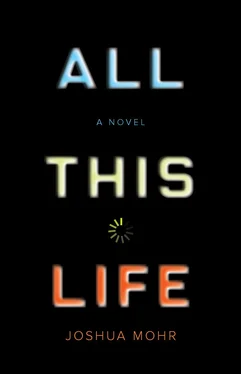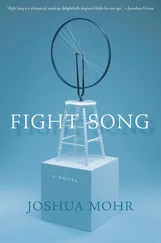“Why are they doing that?” she asks.
“Putting up more condos.”
“They’re ruining the neighborhood,” she says.
“We all ruin the neighborhood when we first come in,” he says. “I did. You did. Now it’s a new set of assholes ruining things. Cities are moving targets, always taking fire. But don’t worry: In ten years, the current assholes will get squeezed out and they’ll be talking like us.”
“Small victories,” she says.
“It’s been a while since I’ve seen you,” he says.
Kathleen can’t think of a reason to lie. Bars can do that to you, especially in places black as confessionals. “I’ve been sober for a few years.”
“I tried that a couple times myself.”
“Bourbon.”
“Welcome back,” he says, pouring them both big ones.
They take their shots at exactly 8:56 in the morning.
“It’s not just the Elbo,” he says. “The Attic closed. So did Pop’s. They’re pricing us out. There might not be any dive bars left in the Mission. Can you imagine? My landlord would love to shut this place down and open some boutique with gourmet cheeses and pedicures.”
“Is it really your birthday?”
“You don’t need an excuse to spank me.”
“Can I have another shot?”
“I’m not sure yet.”
“What does that mean?”
“Have you eaten anything?”
Kathleen shakes her head no, wonders what happened to the quality of service in this establishment. She’s seen people asleep on pool tables, taking a catnap before bellying back up to finish the job — or start the next one. She’s seen people ordering drinks with minds malfunctioning on liquor, talking like stroke victims. And now this guy wants to scrutinize the contents of her stomach?
“I’m not hungry.”
“I need a guinea pig,” he says.
“For what?”
“Be right back.” He disappears through a black door by the bathrooms.
Kathleen sits there, enjoying the beer and the bourbon zooming through her, adding some carbonation to her flat life. It’s not an exaggeration to say that Kathleen feels elated. The galloping demons are having a house party in her head. She wants to play the Beach Boys on the jukebox. She wants to dance. She wants to dance with every member of the Beach Boys. She wants to kiss every Beach Boy and thank them for their harmonies. But she’ll settle for a dance with the cranky barkeep once he’s back. He might know how to cut a rug. This is what’s been missing from her life, a release, an escape. Sobriety is all about being aware and available, and don’t get her wrong, she likes those things, but not all the time.
The bartender comes out carrying a tray. On it are two sourdough bread bowls filled with clam chowder.
“It’s a San Francisco classic!” he says.
“Why is this happening?” she asks.
“I’ve wanted to try this, and you need some food. I keep buying these bread bowls and they rot back there. I always forget about them. But these aren’t that old, I don’t think. At least, no mold I can see. This is perfect. The only way I’ll keep serving you is if you put something in your stomach. Try this with me.”
He hands her a spoon and clutches his, holding it out for Kathleen to cheers with, and she does and there’s a pitiful clinking noise and the bartender smiles.
“Fine,” she says, “I’ll try.”
“Here’s the twist. Here’s what makes my chowder different from all the other joints.” He takes the bourbon bottle and floats a shot right on top of their soups. He stands there beaming at Kat and says, “Merry Christmas!” He mixes everything up in his bread bowl and digs his spoon in for a hearty mouthful.
“Surprisingly refreshing,” he says, heaping more of it in.
Kathleen sits there watching him and can still hear him saying “Merry Christmas,” though it’s nowhere near December and nowhere near funny and his SPANK ME birthday shirt makes Kat even sadder, and since there’s no official kitchen in the back of the bar, this soup is from a can — she hopes — and it should not be eaten, even with the guarantee that the bread isn’t moldy, and all the elation that she had been feeling curdles. In fact, she despises the Beach Boys and their harmonies and dances in dive bars and morning beers and watching a bartender shovel alcoholic chowder in his face is the worst thing you can ever endure.
“I’ll be right back,” she says, pushing herself up, getting her purse, wobbling toward the black door.
“You shouldn’t leave me alone with your bowl,” he calls over. “I might help myself.”
“Go ahead and help yourself!”
“You first!”
“Help yourself!”
“Hurry!” he says.
Kathleen is outside. The whole world is the color of that chowder; the fog makes everyone on the sidewalk squint from its glare as they beeline to the BART station as they’re starting their dutiful day, while Kat can barely stand up. She can’t believe what she’s done, what she’s thrown away. Everything she’s worked so hard to build is dead. She feels the decapitation of drunkenness.
Her hand is in her purse. Her phone is in her hand. Her phone is powered on and put to her ear.
“I’ve been worried about you,” Deb says.
“I’m drunk,” Kathleen says.
“Ah, girl. Where are you?”
“Can you meet me at my house? I’m on my way there.”
“I’ll leave right now,” Deb says. “Don’t beat yourself up. This happens. I’ve relapsed before. It’s a part of the process. I love you and everything will be fine.”
Kathleen hasn’t paid for her bourbon, but she can’t bear the thought of creaking open the black door, seeing him lap that pallid bowl of chowder.
I’m sorry , she thinks, and turns to walk home.
AS KATHLEEN APPROACHESher place, Deb is on the front stoop. She’s holding two coffees, and those steaming to-go cups make Kat crumble. She drops to the sidewalk and sobs.
“Get up,” says Deb. “You’re all right. You’re safe. That’s what matters.”
“Why did I ruin my life again?” Kathleen asks.
“I’m not going to help you up,” Deb says. “You have to do it. Pick yourself up and come over here. Take this cup of coffee from me.”
“It’s over,” she says, still on her knees. “It’s lost.”
“It’s in my hand,” Deb says. “Your coffee is right here.”
Kathleen looks over at her smiling sponsor. Deb wears a camouflage trench coat, a black beanie. She has on huge combat boots and is the kind of badass Kathleen hopes to be. She remembers when she first came to AA — that first meeting. She was so scared to walk into a roomful of strangers and beg for help. Her life was pickled and she couldn’t go on living like that. She must have stood outside of sixty meetings but could never get up the courage to go in. But eventually, she did. Eventually, she entered that room and sat down in a folding chair that felt made of paperclips and listened, didn’t say one word the whole hour, until the end when the group was asked if anyone had any announcements and Kathleen stood up and said, “This is my first day sober and I don’t know what I’m supposed to do, I’m scared, please help,” and that was the beginning — that was the first time she truly understood the definition of the word surrender . She walked in and gave herself up and these people immersed her in their empathy.
Deb had approached her right after the meeting and asked if she needed a sponsor, and they’ve been in daily contact ever since.
And here they are now: Kathleen, decimated, liquored-up, heart-broken, and Deb waiting on her doorstep with hot coffee. The world can be horrible and beautiful at the same time.
“It’s getting cold,” Deb says, shaking the coffee cup.
Читать дальше












